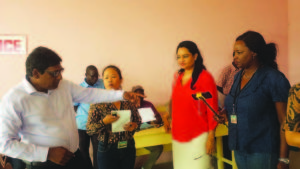…Parliamentary Sectoral Committee hears during visit

A visit by the Parliamentary Sectoral Committee on Social Services to the Linden Hospital Complex (LHC) on Tuesday revealed several appalling issues, including drug shortages, a dysfunctional ECG machine, shortage of cutting edge needles, insufficient monitors, issues with sections of the roof, cracks in some parts of the building and the need for more dental staff.
The Committee – consisting of Opposition Members of Parliament Dr Vindhya Persaud, Dr Vishwa Mahadeo, and Indranie Chandarpal as well as Minister within the Communities Ministry Valerie Patterson and others – visited all sections of the medical institution to get a first-hand look at the conditions under which patients receive care and some of the challenges faced by staff.
LHC Chief Executive Officer (CEO), Dr Farouk Riyasat and Medical Superintendent, Dr Steve Mark facilitated the tour of various wards. Over at the Hospital’s treatment bay, staff complained of a shortage of drugs and injectables, noting that patients have also complained of a lack of insulin as well as the unavailability and cost of some medications. At the pharmacy, the Chief Pharmacist pointed out that sometimes medications ordered were not received.
“Sometimes, you order and you don’t get what you order,” she told the Parliamentary Committee.
She added that the Hospital was promised an “emergency order” which was expected to be facilitated on Wednesday. According to the pharmacist, 89 types of drugs were said to be on the pharmacy’s mailing list. Of that number, 19 are critical medication. However, the chief pharmacist explained that in-house patients were the only ones who would benefit from the present supplies. It was noted by Regional Health Officer Pansy Armstrong that only about G$8 million to G$11 million in emergency drugs money was allocated annually.
Some members of the Committee agreed that it was a small amount, which may have contributed to the other hospitals in the Region being affected. At the Hospital’s laboratory, Senior Medical Technologist Melanie Sinclair stressed the need for the Microbial Department to be functional, as she noted that no cultures were being done. She said there was a room to facilitate this activity, but pointed to the absence of relevant staff. The staffer also stressed the need for microbiologists and technologists.
The CEO noted that Cuban microbiologists were expected, while others expressed an interest also in having local trained staff. According to Sinclair, the Department is more populated with medical technicians. “We have equipment, but we don’t have any person who is trained to do it…We have few technologists,” she said.
In response, Dr Mahadeo said given the level of emergency cases, more staff was needed. The need for a backup biochemical machine was also highlighted, since it was noted that only one was present. Additionally, the Committee was told of insufficient blood supplies despite blood drives at the Hospital. Presently, Sinclair said there was a demand for O positive blood in Linden. Dr Mahadeo suggested that the LHC moved towards securing a blood coordinator.
At the X- ray department, staff asked for an ECG machine. Members of the Committee also made recommendations for a CT scan machine, owing to the available space and staff. A local doctor also stressed the need for a printer and computerised system to enhance patients’ records.
Following the tour of the Hospital, Dr Persaud noted that the issue of drug shortages seemed to be chronic across the country, while indicating that there were issues which were peculiar to the LHC. She said that while some issues may not require major input, others may.
“In the areas where there were deficiencies and inadequacies like in terms of medication, equipment or any other area that was raised, it would be very good if the Parliament Office can have substantiating documentation…because at the end of the day, what we hope is that you would benefit more,” she said.
Dr Persaud said parliamentary staff would be writing to the institution soon and a draft report would be prepared. She also noted the similarities at hospitals visited. “There are certain medications that are consistently absent in the system. Diabetic and hypertensive medication in particular and those are the largest populations we have to deal with. So it’s challenging and a bit frustrating for people in the system.” Meanwhile, Dr Mahadeo said so far the LHC was the best kept of the three hospitals visited so far.
CEO Riyasat also pointed out plans to expand and include new services such as dialysis and chemotherapy services for this year, noting that currently dialysis patients are referred to Georgetown Public Hospital. (Utamu Belle)



